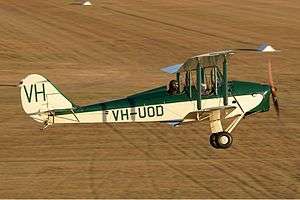Genairco Biplane
The Genairco Biplane (also known as the Genairco Moth) was a utility biplane built in small numbers in Australia in the late 1920s and early 1930s.[2]
| Biplane | |
|---|---|
 | |
| Genairco inflight at Bundaberg Airport | |
| Role | Utility aircraft |
| National origin | Australia |
| Manufacturer | Genairco |
| Designer | George Beohm[1][2] |
| First flight | 1929 |
| Status | Three extant |
| Number built | 9 |
| Type | |
| Manufacturer | Harkness and Hillier[2] |
| Designed by | Don Harkness |
Design and construction
It was a conventional single-bay biplane with fixed tailskid undercarriage, with a fuselage based on the de Havilland Moth and wings based on the Avro Avian. The fuselage, however, was wider than that of the Moth, allowing two passengers to be carried seated side-by-side in an open cockpit ahead of the pilot's. Some later examples of the type featured an enclosed cabin for the passengers, and these were known as Genairco Cabin Biplanes, with the original design retrospectively named the Genairco Open Biplane.
Survivors
Three Genairco biplanes have survived.
Australia
- Airworthy
- VH-UOD, an Open Biplane, was restored and is maintained in airworthy condition.
- Stored
- VH-UOG, an Open Biplane, is owned by the Museum of Applied Arts and Sciences, also known as the Powerhouse Museum, in Sydney, New South Wales.
United States
- Stored
- N240G (previously VH-UOH and then VH-UUI), a Cabin Biplane, was exported from Australia in 1966 and is awaiting restoration by the Fantasy of Flight museum at Polk City, Florida.
Specifications
Data from [3]
General characteristics
- Crew: 1
- Capacity: 2 pax
- Wingspan: 30 ft 9 in (9.37 m)
- Height: 8 ft 10 in (2.7 m)
- Empty weight: 944 lb (428 kg)
- Gross weight: 2,100 lb (953 kg)
- Powerplant: 1 × Harkness Hornet[2] , 115 hp (86 kW)
- Propellers: 2-bladed wooden fixed-pitch propeller
Performance
- Maximum speed: 105 mph (169 km/h, 91 kn)
- Landing speed:38 mph (33 kn; 61 km/h)
- Rate of climb: 800 ft/min (4.1 m/s)
gollark: I am the protagonist. I have to ignore most of the universe due to time constraints.
gollark: I mean, there's lots of cool software from the 1960s I'm disregarding now.
gollark: Probably!
gollark: They'd have to understand and rewrite it from scratch.
gollark: That would be impractical.
References
| Wikimedia Commons has media related to Genairco Biplane. |
- "Aust. Plane Designer Back Here". The Sun (10852). New South Wales, Australia. 31 October 1944. p. 7 (LATE FINAL EXTRA). Retrieved 8 June 2019 – via National Library of Australia. ,...
- "AUSTRALIA BUILDS HER FIRST AEROPLANE". Daily Pictorial (15, 897). New South Wales, Australia. 21 November 1930. p. 1. Retrieved 8 June 2019 – via National Library of Australia. , ...FIRST ALL-AUSTRALIAN BUILT 'PLANE after highly successful tests at Mascot yesterday. The 'plane, which has been called the Genairco," was designed and built by Mr. Geo. Beohm, and the engine was designed by Mr. Don Harkness, and built by Harkness and Hillier, of Five Dock. In the picture are:. Mr. Childs (Commissioner of Police), Capt. Leggatt (pilot), Mr. Geo. Beohm, the Governor, Mr. Boyle (managing director, General Aircraft Co.), and Mr. Don Harkness...
- Grey, C.G., ed. (1931). Jane's all the World's Aircraft 1931. London: Sampson Low, Marston & company, ltd. p. 80c.
Further reading
- Taylor, Michael J. H. (1989). Jane's Encyclopedia of Aviation. London: Studio Editions. p. 417.
External links
This article is issued from Wikipedia. The text is licensed under Creative Commons - Attribution - Sharealike. Additional terms may apply for the media files.